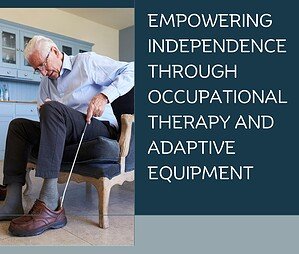By Desirée Gagné, MA, OTR/L
Amputation is a major life change that can have a significant impact on an individual’s emotional well-being. It is not uncommon for those individuals that have suffered limb loss to experience a range of emotions, including grief, depression, anxiety, anger, and frustration. These emotions are often related to the loss of a limb, the changes in body image, and the challenges of adapting to a new way of life.
It is important to remember that everyone experiences amputation differently. There is no right or wrong way to feel, and there is no set timeline for recovery. Some people may adjust to their new situation quickly, while others may take longer. Some individuals with limb loss may experience only mild emotional distress, while others may experience more severe symptoms that require professional help. It is important to be patient with yourself and to allow yourself to grieve the loss of your limb.
Some of the most common emotional changes that amputees experience include:
- GRIEF: It is normal to feel grief after losing a limb. This is a natural process of mourning the loss of a part of your body.
- ANGER: This anger may be directed at yourself, the medical professionals who performed the amputation, or the person or event that caused the amputation.
- DEPRESSION: Depression is another common emotional change that may occur after amputation. Depression can manifest itself in various ways, including feelings of sadness, hopelessness, and worthlessness.
- ANXIETY: Anxiety may be related to the fear of losing the other limb, the fear of not being able to do the things you used to do or the fear of being judged by others.
- BODY IMAGE ISSUES: Amputation can lead to changes in body image. This can be a difficult adjustment for many people.
- SOCIAL ISOLATION: This can be due to a number of factors, such as fear of being judged by others, difficulty getting around, or changes in physical appearance.
If you are experiencing any of these emotional changes, it is important to seek help. There are a number of resources available to help you cope with the emotional changes that may occur after amputation.
Resources for Coping Include:
- YOUR DOCTOR OR OTHER HEALTHCARE PROVIDER: These professionals can provide you with support and guidance as you cope with the emotional changes that may occur after amputation.
- A THERAPIST OR COUNSELOR: A therapist or counselor can help you to understand and assist you with learning different coping mechanisms for emotions you may experience.
- A SUPPORT GROUP: A support group can provide you with a place to connect with other people who have experienced an amputation. This can be a great way to connect with other people who understand what you are going through.
- ONLINE RESOURCES: There are a number of online resources available to help you cope with the emotional changes that may occur after amputation.
Additional tips for coping with the emotional changes associated with amputation include:
- Set realistic goals for yourself. Don’t expect to be able to do everything you used to do right away. Start small and gradually work your way up.
- Accept help from others. Don’t be afraid to ask for help from your friends, family, or healthcare team.
- Allow yourself to grieve the loss of your limb. It is normal to feel sad, angry, or frustrated. Don’t try to bottle up your emotions.
- Talk to someone you trust about how you are feeling. This could be a friend, family member, therapist, or counselor.
- Learn about adaptive equipment and techniques. Many resources are available to help you adapt to your new life with an amputation. Physical and Occupational Therapists are a great resource for this.
- Everyone has strengths and weaknesses. Focus on your strengths and use them to your advantage.
- Don’t give up on yourself. With time and effort, you will adjust to your new life.
- Focusing on the positive aspects of your life.
It is important to remember that you are not alone. Healing from amputation is a process that takes time. There are many people who have experienced amputation and who understand what you are going through. Coping with the emotional changes associated with amputation can be challenging, but it is possible. With time and support, you can learn to live a full and productive life with an amputation.
Whether you need to set up your first-time prosthetic evaluation appointment, discuss how to improve the comfort and fit of your current prosthetic limb or talk to someone who can help you reach higher goals, Rehability is here for you. Please contact us at (352) 701-0494 to speak to a team member or to schedule a free consultation appointment.
DISCLAIMER:
This article is intended to provide general health information and is not intended to provide individual-specific medical advice, diagnosis, or treatment.



